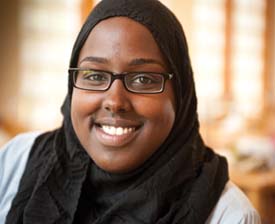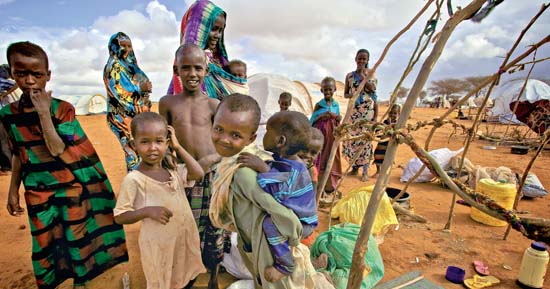 |
 |
| current issue |  | past issues |  | send a letter/news |  | address update |  | advertise |  | about us |  | alumni home |
Campus Currents
|
Help and Hope for Somalia
A master's degree helps the founder of a nonprofit make it better |
Easy to print version |
 Perry Smith/UNH Photographic Services |
It was only after her father died that Hibak Kalfan '12G realized she needed to do something about Somalia. The daughter of Somali parents who immigrated to the United States in the '70s, she had visited Somalia growing up and seen how her cousins there lacked the opportunities she'd had. Since then, 20 years of civil war had left the country with displaced populations, crumbling infrastructure, violence and poverty. Her father's death of liver disease in 2005 led to serious soul searching and the realization that she was better off than more than 90 percent of the Somalis in the world.
In 2007, Kalfan and her friend Ahmed Abdi founded a grassroots nonprofit organization, The African Future, hoping to improve education and health care in Somalia. At 27, Kalfan was ready to leave a promising career in banking. The pair traveled to Somalia and made a documentary about the health care system, to raise awareness and funds.
When drought and famine struck in 2010, putting 750,000 Somalis at risk of starvation, Kalfan and her coworkers decided to change gears. They organized four convoys to deliver food baskets of rice, porridge, dates, tea and other traditional foods to Somalis living in makeshift shelters. Over a four-month period, the group fed 50,000 Somalis.
 Brenda Phillips |
This work was rewarding, though not without difficulties—Kalfan once had a gun held to her head at a checkpoint. But she and Abdi wanted to improve the nonprofit and more clearly define its scope. "I never had the theoretical background or knew the proper steps for how development work is supposed to be done," she says. In 2011, she enrolled in UNH's new master's program in development policy and practice at UNH's Carsey Institute.
The appeal of the program to Kalfan—and what makes it unusual—is its structure. Students take courses at UNH their first summer and develop a project plan. During the academic year, they implement their plan on their home turf, take online courses and receive online support from faculty. They return to campus for a final summer of coursework and project evaluation.
In the process, Kalfan restructured her nonprofit, hired an operations director and launched a pilot "twinning project," which matches a school and hospital in Somalia with a similar pair in the Somali Diaspora. "I do have hope," says Kalfan, "that in the next 5, 10, or 15 years we'll start to see some real change in Somalia."
blog comments powered by Disqus

